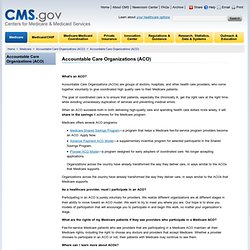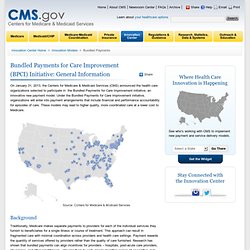

Accountable Care Organizations (ACO) What's an ACO?

Accountable Care Organizations (ACOs) are groups of doctors, hospitals, and other health care providers, who come together voluntarily to give coordinated high quality care to their Medicare patients. The goal of coordinated care is to ensure that patients, especially the chronically ill, get the right care at the right time, while avoiding unnecessary duplication of services and preventing medical errors. When an ACO succeeds both in both delivering high-quality care and spending health care dollars more wisely, it will share in the savings it achieves for the Medicare program. Medicare offers several ACO programs: Medicare Shared Savings Program—a program that helps a Medicare fee-for-service program providers become an ACO. The Pioneer ACO Model. Health Reform Explained. P2 Collaborative of WNY, Inc. Center for Medicare & Medicaid Innovation. Timeline of the Affordable Care Act. US Healthcare Timeline. American Medical Association (AMA) becomes a powerful national force.

In 1901, AMA reorganizes as the national organization of state and local associations. Membership increases from about 8,000 physicians in 1900 to 70,000 in 1910 -- half the physicians in the country. Center for Medicare & Medicaid Innovation. Background Traditionally, Medicare makes separate payments to providers for each of the individual services they furnish to beneficiaries for a single illness or course of treatment.

This approach can result in fragmented care with minimal coordination across providers and health care settings. Payment rewards the quantity of services offered by providers rather than the quality of care furnished. Medicaid Provisions Update - July 2012. HealthCare.gov. Health Care Costs Institute.